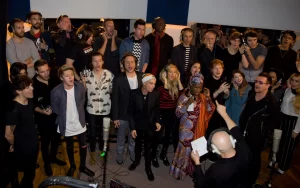Sheeran wishes he wasn’t on the new Band Aid song
4 min read
Ed Sheeran performed on the charity single

Ed Sheeran performed on the charity single
Ed Sheeran has expressed regret over his inclusion in the upcoming 40th-anniversary version of Do They Know It’s Christmas?, saying that he was not consulted about the use of his vocals and would have declined the offer if asked. The re-release, set to coincide with the anniversary of the original charity single, features Sheeran’s vocals alongside those of Sting from the 1984 version, as well as contributions from other major artists like Sam Smith, One Direction, Coldplay, and Rita Ora.
In an Instagram post, Sheeran explained that he had been unaware of the new version until after it had been finalized. He stated, “My approval wasn’t sought on this new Band Aid 40 release. Had I had the choice, I would have respectfully declined the use of my vocals.” The singer added that his understanding of the song and its associated narrative had evolved over time, particularly after being influenced by a post from British-Ghanaian rapper Fuse ODG. Fuse ODG has long been critical of Band Aid’s portrayal of Africa, and Sheeran echoed these concerns in his message, writing, “A decade on and my understanding of the narrative associated with this has changed, eloquently explained by @fuseodg. This is just my personal stance, I’m hoping it’s a forward-looking one. Love to all x.”
Sheeran’s sentiments reflect a broader debate surrounding Band Aid’s legacy, especially within African communities. Fuse ODG, who turned down the invitation to participate in Band Aid 30 in 2014, has been an outspoken critic of the initiative. In his post, Fuse ODG explained his reasons for refusing to be part of the project, saying that Band Aid’s approach to charity perpetuated harmful stereotypes about Africa. “While they may generate sympathy and donations, they perpetuate damaging stereotypes that stifle Africa’s economic growth, tourism, and investment, ultimately costing the continent trillions and destroying its dignity, pride, and identity,” he wrote.
The musician, whose real name is Nana Richard Abiona, told BBC Radio 1 that when he first saw the Do They Know It’s Christmas? videos as a child, the portrayal of Africa as a place defined only by “famine and poverty” left him feeling ashamed of his heritage. “The images were so negative that I wanted to disassociate myself from being African because there was no sense of pride in it,” he said. He added that he had spoken to Bob Geldof, who organized the original Band Aid project, about these concerns in 2014. Fuse ODG suggested that Band Aid could have done more to present Africa as a partner in its own development, rather than as a charity case. “We could make it more like a partnership – solidarity instead of charity,” he said.

The latest version of Do They Know It’s Christmas?, which will be released on November 25, combines elements from various iterations of the song, featuring contributions from stars including Harry Styles, George Michael, Sam Smith, and Bono. The song, first recorded in 1984 to raise funds for the famine crisis in Ethiopia, has been criticized over the years for its portrayal of Africa as a continent in desperate need of Western intervention. Critics have argued that the lyrics promote a paternalistic, colonial view of Africa, reinforcing negative stereotypes that have long plagued the continent’s image in the West.
Indrajit Samarajiva, a writer and critic, has called the song’s message “ignorant and colonial,” saying that it was “more about making white people feel good than helping anyone.” This critique echoes the sentiments of many who believe that such charity campaigns often portray Africa as a hopeless region rather than a place with its own agency and potential.
Despite the criticism, Bob Geldof, who co-wrote the song with Midge Ure, defended the Band Aid project over the weekend in a written response to an article in The Conversation. Geldof dismissed the accusations of “colonial tropes,” arguing that Band Aid has saved countless lives over the years. He pointed out that the initiative has continued to provide aid, including substantial contributions to Sudanese refugees and children in Ethiopia. “This little pop song has kept hundreds of thousands, if not millions, of people alive,” Geldof wrote, underscoring the impact of the funds raised by the song, particularly in the ongoing humanitarian crises in Sudan and Ethiopia.
While Sheeran and Fuse ODG’s criticisms highlight ongoing concerns about the portrayal of Africa in Western charity efforts, Geldof’s defense underscores the complexities of the issue. For many, the question remains whether initiatives like Band Aid can evolve to avoid harmful stereotypes while still providing essential aid to those in need. The debate continues to evolve as artists, activists, and the public grapple with the legacy and future of charity campaigns in an increasingly globalized world.